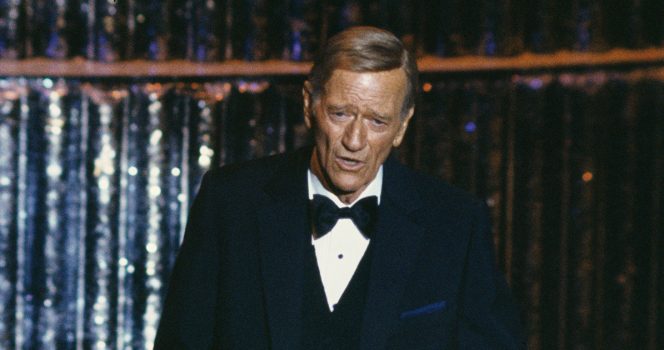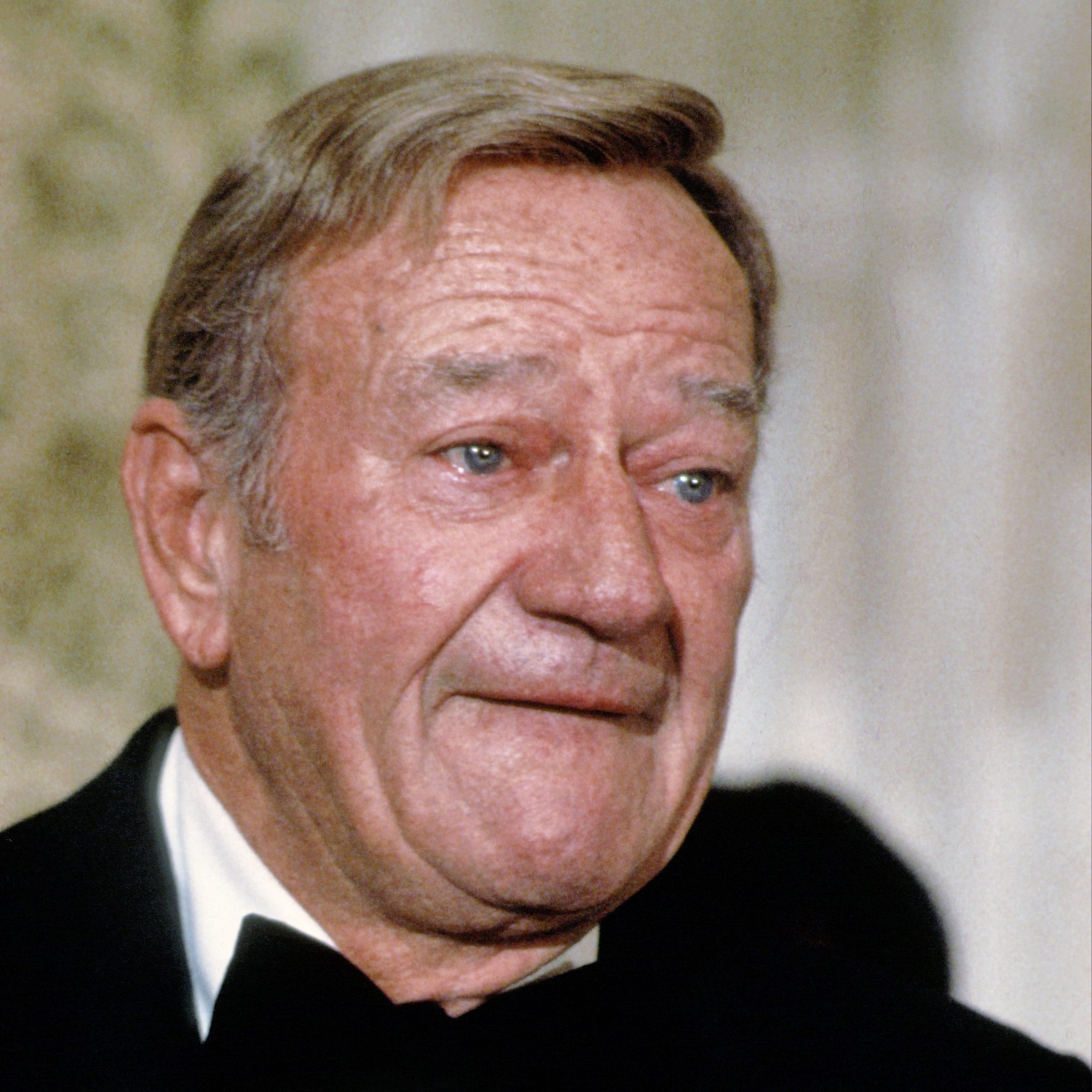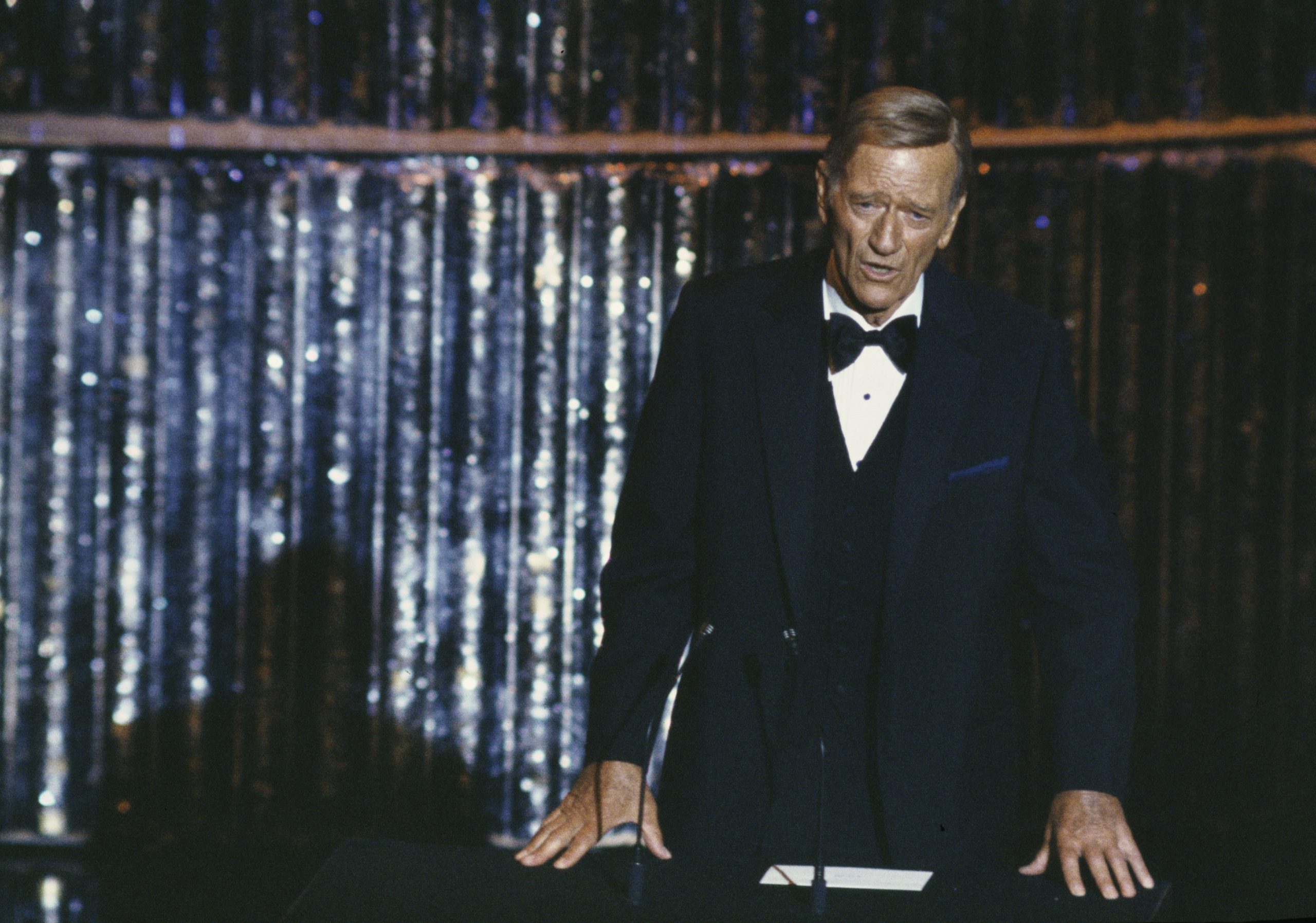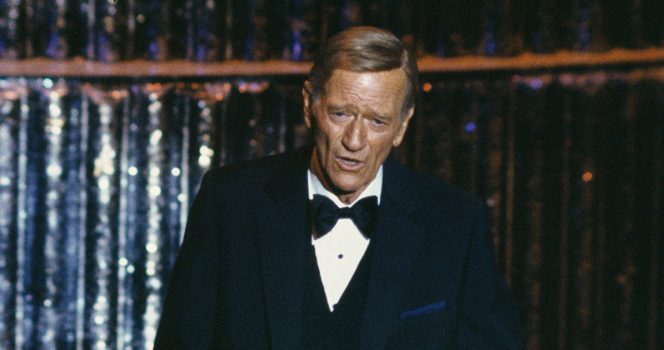When the 51st Academy Awards opened on April 9, 1979, few moments were as anticipated as the appearance of John Wayne. For more than five decades, Wayne had defined an entire era of American cinema — a symbol of rugged heroism, classic Western storytelling, and unmistakable screen presence. But on that night, his return to the public eye held a deeper significance. He had endured a series of major health challenges in the years before the ceremony, and his arrival onstage became one of the most emotional Oscar moments of the decade.
A Year Marked by Health Battles

Only three months before the ceremony, John Wayne underwent what was expected to be routine gallbladder surgery. Instead, doctors discovered stomach cancer. The operation lasted more than nine hours, and surgeons removed his entire stomach.
By the time the Oscars approached, many wondered whether the 72-year-old actor would be able to attend at all.
This was not his first encounter with life-threatening illness. Fifteen years earlier, in 1964, Wayne had survived lung cancer, undergoing surgery that removed a lung and several ribs. In 1978 — just one year before this Oscars appearance — he missed the ceremony while recovering from open-heart surgery to replace a valve.
Given these circumstances, his willingness to appear onstage represented not only professional dedication but personal resilience.
Hollywood Watches for “The Duke”
Bob Hope, a close friend and longtime collaborator, contacted Wayne personally to ask if he would attend. Wayne agreed.
Inside the Dorothy Chandler Pavilion, the audience included actors, directors, and industry figures who had witnessed his entire career — from silent films in the 1920s through the height of Hollywood’s studio era. They knew his work, his influence, his controversies, and his longevity. On this night, however, the focus was less on public debate and more on admiration for a performer who had shaped generations of filmmaking.
A Standing Ovation That Stopped the Room

When Wayne finally stepped into the spotlight, he descended the staircase with the familiar gait that had become part of his screen identity. Observers noted that he was thinner than in previous years, but his posture, smile, and presence were unmistakably his.
The audience rose to its feet almost instantly. The applause continued long past the initial greeting, building into a sustained ovation. This was not merely appreciation for past performances — it was recognition of perseverance, a tribute to a career that had spanned more than 170 films, and a sign of respect for a man who had pushed through profound physical hardship simply to be present.
When the applause settled, Wayne spoke briefly. In his characteristic calm, warm tone, he said the words that became the most memorable moment of the night:
“That’s just about the only medicine a fellow would ever really need.”
The response was immediate. The room erupted again.
A Reflection on Longevity
After the crowd quieted, Wayne continued with a lighthearted acknowledgment of his long career:
“Believe me when I tell you that I’m mighty pleased that I can amble down here tonight. Oscar and I have something in common. Oscar first came to the Hollywood scene in 1928. So did I. We’re both a little weather-beaten, but we’re still here and plan to be around for a whole lot longer.”
The audience reacted with humor and emotion. Some laughed; others wiped away tears. The remark carried a mixture of strength and vulnerability — a reminder of Wayne’s legacy and his determination to keep going.
Presenting Best Picture
That night, Wayne’s role was to present the nominees for Best Picture:
-
The Deer Hunter
-
Coming Home
-
Midnight Express
-
An Unmarried Woman
-
Heaven Can Wait
When he opened the envelope and announced The Deer Hunter as the winner, he stepped back as the producers accepted their award. Many in the audience did not realize that this would be Wayne’s final public appearance.
The Weeks After the Oscars

On April 20, 1979, just eleven days after the ceremony, Wayne was admitted to UCLA Medical Center with a bronchial condition. He was discharged a week later, and on his seventy-second birthday, May 26, he was awarded the Congressional Gold Medal — one of the highest civilian honors in the United States.
Sixteen days later, on June 11, John Wayne passed away at UCLA Medical Center.
In his final months, he had volunteered for experimental cancer-vaccine research, telling doctors:
“If this is helpful, I’m going to help you afterward.”
Even facing significant illness, he looked ahead to how he could contribute.
A Legacy Carried Forward
Following his death, Wayne’s family established the John Wayne Cancer Institute, which has become known for research in cancer treatment, early detection, and innovative medical programs. Wayne’s name — long associated with cinematic heroism — took on an additional meaning through this philanthropic work: a commitment to improving medical outcomes for others.
A Private Burial, Later Revealed
John Wayne was buried at Pacific View Memorial Park in Newport Beach, California. The cemetery sits on a hillside overlooking the ocean — a fitting location for someone who had always spoken of his love for the American West and the outdoors.
For decades, the exact site of his grave remained unmarked and unknown to the public. According to reporting from the Los Angeles Times, security prevented fans from attending the funeral, and the family chose privacy over publicity. The grave remained without a marker for twenty years before eventually receiving a headstone that matched the peaceful landscape.
The Night Hollywood Will Never Forget
John Wayne’s appearance at the 1979 Oscars lasted only a few minutes, yet it became one of the most widely remembered moments of the ceremony.
It was not because of dramatic speeches or grand gestures. It was because of a quiet, sincere acknowledgment from a man who had spent his life in front of the camera — a brief moment where the audience saw not the characters he played but the person behind them.
Those five words — “the only medicine a fellow needs” — captured gratitude, emotion, and resilience. Hollywood applauded not the mythic cowboy, but the human being who stood onstage, determined, weathered, and still smiling.
More than four decades later, that moment remains one of the Academy Awards’ most heartfelt tributes.
